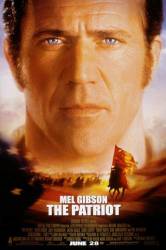Continuity mistake: In the beginning when the girl is holding up a card in front of the boy, her grip on the card changes when she lowers it. (00:01:55)
Continuity mistake: When Thomas and Gabriel come out of the woods and spot the postman, Thomas start running and runs quite a distance from Gabriel. When it cuts Thomas is just a few feet away from Gabriel while running. (00:02:50)
Continuity mistake: When Benjamin comes down the steps out of the meeting, he walks towards his oldest son signing up. He approaches his son and his son is facing away, but they cut back to Benjamin and his son is facing him. They cut back to the son and he turns around and then back to Benjamin and it's the same shot again. His son was turned around before he turned around. (00:15:35)
Revealing mistake: When Benjamin and Harry are talking on the steps of the legislature of Charlestown after deciding to go on war with the British, you can see a man behind them with something in his ear, a hearing aid or earpiece. (00:16:30)
Continuity mistake: When Thomas is sitting by the window painting his tin figure he looks out the window while holding his brush away from the figure. When it cuts to close-up the brush is on the figure. (00:21:40)
Continuity mistake: When Gabriel wakes up after having had his wound treated he lifts his hand, covering his eyes. When it cuts his hand is suddenly on his forehead. (00:24:35)
Continuity mistake: In the scene where the boys go down to the river and see the bodies floating, Benjamin tells his daughter to go bring them back. As she is running through the field you see her trip into the grass right before they switch camera shots. where she is standing with her brothers like nothing happened. (00:24:45)
Continuity mistake: When Thomas is shot, the entry and exit wounds are the same height. SInce the shooter was on horseback, the exit wound should be lower. (00:29:15)
Factual error: Mel Gibson's son has toy soldiers from the future. In one shot when he is melting one of the soldiers it is visible. Although it has a red uniform it isn't a British soldier. In fact it depicts Hofburg Trabanten Leibgarde which was the personal guard of the sovereign originally from Austria, in uniform from around 1850 - 1918. (01:10:55)
Factual error: When Cornwallis is preparing to hang the militia they are testing the gallows which have trap doors, these were not yet being used at the time of the American Revolution. (Source director's commentary.) (01:27:00)
Continuity mistake: When the Colonial militia leave after the parlay with Cornwallis, Benjamin Martin whistles for the two dogs. The dogs can be seen running through the gates at the heels of the militia but do not appear in any other of the scenes with the militia riding back to camp. (01:34:50)
Audio problem: After Gabriel shoots Tavington, he walks over to finish him off with his knife. He tosses it up in order to change his grip. When he does so, we hear metal scraping against metal, but he tossed the knife through the air, so it could not possibly have made that sound. (02:08:05)
Continuity mistake: In the final battle (Cowpens) when the milita are lined up, and Ben says "Take aim!" the first time, watch the guy behind Ben. The camera will show Ben and Jean(French guy). It will then show the line of milita aiming. Then the camera goes back to Ben and Jean. There is a different guy behind them. (02:32:35)
Revealing mistake: In the close-up on the three French officers directing the bombing of Yorktown, the one on the left is trying to hold a laugh. (02:33:47)
Factual error: In the scene at Lord Cornwallis' outdoor party celebration, right after Benjamin Martin and his Continental Army blows up a British Ship, one of Lord Cornwallis' Captains throws back a big gulp of his drink from his Martini glass in grief and disbelief - the problem is this movie takes place in the mid 1700s and the Martini Glass wasn't invented until the 1920s, during the Roaring Jazz days.
Factual error: In one scene Lord Cornwallis' adjutant announces to Lord Cornwallis that a messenger (Benjamin Martin) has arrived. After initially dismissing the message, Lord C. pays attention on the mention of two "Great Danes" in Martin's company. The Great Dane as we know it today had many names over the centuries, but the Danish connection only became common use in the 19th century (Comte de Buffon - l'Histoire Naturelle - 1811). Until then the British would have called them Mastiffs (English or German), English Dogges, or perhaps even Boarhounds. Actually - the English Kennel Club of Britain didn't officially recognize the term/breed "Great Dane" until 1884.
Factual error: When Benjamin is handing a store clerk some money, he is giving him a $5 bill with Abraham Lincoln on it. This happened more than 80 years before he was president. And they didn't even use dollars during the Revolutionary war. They would have used British pounds.
Factual error: All soldiers in the Continental Army are wearing the same uniforms. Officers and enlisted men wore significantly different uniforms.
Visible crew/equipment: In the final battle scene where Benjamin is fighting Tavington one-on-one, the camera angle widens and shows the whole battle scene. In the bottom right corner, you can see another camera filming the action.
Continuity mistake: The beginning starts in 1776. The film ends in the year 1781 with the battle of Cowpens, a five year period. The children in the film do not age in that five years, except the youngest and that is after what I judged a six month period.






Answer: I think the one you want is 'Unseen' - By Craig Armstrong which is track 2 on the Plunkett and Macleane soundtrack.